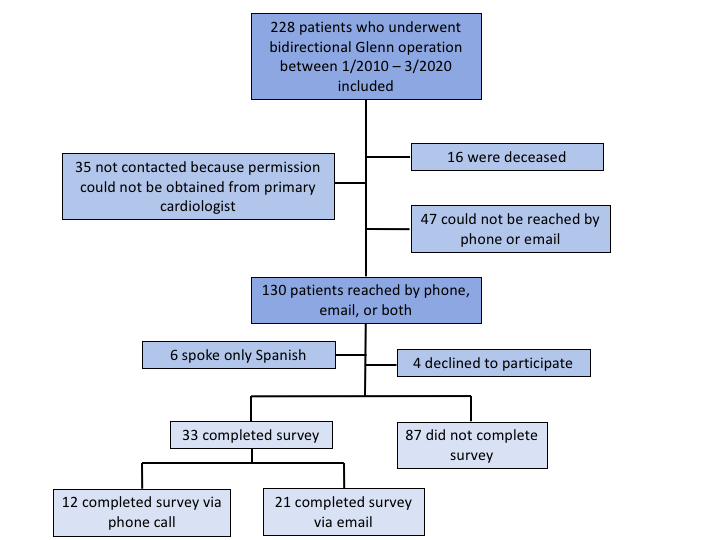Cardiology
Cardiology 3
716 - Parental Perceptions of the Effect of the COVID-19 Pandemic on Outpatient Services for Patients with Single Ventricle Congenital Heart Disease
Monday, May 1, 2023
9:30 AM - 11:30 AM ET
Poster Number: 716
Publication Number: 716.4
Publication Number: 716.4
Denis J. Donovan, NewYork-Presbyterian Morgan Stanley Children's Hospital, Lynbrook, NY, United States; Matthew Theoharakis, NewYork-Presbyterian Morgan Stanley Children's Hospital, New York, NY, United States; Anna Rose, Columbia University Vagelos College of Physicians and Surgeons, New York, NY, United States; Michael A. Fremed, Columbia Vagelos College of Medicine and NewYork-Presbyterian Morgan Stanley Children's Hospital, New York, NY, United States; Sophia Chrisomalis-Dring, NewYork-Presbyterian Morgan Stanley Children's Hospital, new york, NY, United States; Anne Ferris, Columbia University Vagelos College of Physicians and Surgeons, Scarsdale, NY, United States
- DD
Denis J. Donovan, II, MD
Clinical Fellow
NewYork-Presbyterian Morgan Stanley Children's Hospital
Lynbrook, New York, United States
Presenting Author(s)
Background: Patients with congenital heart disease (CHD), particularly those with single ventricle CHD (SV-CHD), experience neurodevelopmental delays relative to their peers. The COVID-19 pandemic created challenges surrounding access to care, placing patients with SV-CHD at risk of negative impact.
Objective: This study seeks to determine the extent to which the pandemic affected the delivery of outpatient therapies to this high-risk population, and satisfaction with those services.
Design/Methods: This is a survey study of parents of SV-CHD patients regarding receipt and satisfaction with outpatient services (e.g. speech/physical/occupational therapy) at various stages of the pandemic. Patients were eligible if they underwent a bidirectional Glenn operation, a common surgery for various SV-CHD diagnoses, from 1/1/10-3/1/20 at our major pediatric cardiac center. Patients were contacted by phone/email. The survey gathered information about the type, frequency, and mode of delivery of services pre-pandemic (pre-2020), at the height of the pandemic (2020-2021), and now (2022). Satisfaction was rated on a 5-point Likert scale. Survey results were compiled and reported.
Results: Of 228 eligible patients, 126 were reached and asked to take the survey. Of the 33 (26%) who completed it, 17 (52.5%) had a developmental delay diagnosis. During the pandemic, most (n=15, 88%) patients who qualified for services continued to receive them. Services were largely virtual or hybrid (n=11, 73%), compared to 100% in person pre-pandemic and now. Many (n=8, 53%) found services hard to obtain during the pandemic for reasons including cancellations, limited space, or issues with remote services, though only 14% (n=2) report difficulty now. Overall satisfaction with services during the pandemic was low, with only 13.3% (n=2) stating they were “extremely satisfied.” Although most (53.8%) of parents feel that quality has improved compared to during the pandemic, satisfaction did not reach pre-pandemic levels, with 93.3% (n=14) reporting they were “extremely satisfied” prior to the pandemic versus 54% (n=7) currently.
Conclusion(s): In our study, patients with SV-CHD continued to receive services during the height of the pandemic. However, the mode of delivery was mostly virtual and parental satisfaction was lower. While satisfaction has since improved, it did not return to pre-pandemic levels. Further studies may be needed to elucidate if changes in the delivery of services during the pandemic may have negatively affected neurodevelopmental status in this and other high-risk groups.

